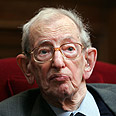
UK: Jewish historian Eric Hobsbawm dies at 95
Lifelong socialist and one of Britain's most eminent historians dies in London after battle with leukemia
Eric Hobsbawm, a lifelong socialist and one of Britain's most eminent historians, has died at the age of 95, his daughter said Monday.
Julia Hobsbawm said her father died overnight at a London hospital. He had been suffering from pneumonia.
"He'd been quietly fighting leukemia for a number of years without fuss or fanfare," Julia Hobsbawm said. "Right up until the end he was keeping up what he did best, he was keeping up with current affairs, there was a stack of newspapers by his bed."

Hobsbawm said he was 'lucky to live in Berlin' before Hitler's rise to power (Photo: EPA)
Hobsbawm was one of Britain's most distinguished historians, his works on the 20th century read by generations of students, despite an allegiance to the Communist Party that he retained long after many supporters left in shame and disgust.
Hobsbawm's reading of Karl Marx and his experience living in Germany in the 1930s formed his views. He joined the Communist Party in England in 1936 and stayed a member long after Soviet military force crushed the Hungarian uprising in 1956 and the liberal reforms of the Prague Spring in 1968, although he publicly opposed both interventions.
Hobsbawm is best known for three volumes, spanning the period from 1789 to 1914: "The Age of Revolution" (1962), "The Age of Capital" (1975) and "The Age of Empire" (1987). A later volume, "Age of Extremes," took the story forward from 1914 to 1991.
His last book, "How to Change the World," published in 2011, was not a revolutionary tract but a collection of essays dating back to the 1960s on Marx and Marxism.
The late British historian A.J.P. Taylor said Hobsbawm's work was distinguished by precise explanations of what happened and his interest in ordinary people.
"Most historians, by a sort of occupational disease, are interested only in the upper classes and assume that they themselves would have been numbered among the privileged if they had lived a century or two ago — a most unlikely assumption," Taylor wrote. "Mr. Hobsbawm places his loyalty firmly on the other side of the barricades."
Eric John Ernest Hobsbawm was born June 9, 1917, in Alexandria, Egypt to Jewish parents. His father was British, descended from artisans from Poland and Russia, and his mother's family were cultured, middle-class Viennese.
The family moved to Vienna when he was two. Following the deaths of his father and then his mother, he moved to Berlin in 1931 to live with relatives, and joined the Socialist Schoolboys.
"In Germany there wasn't any alternative left," he said in an interview with Maya Jaggi published in The Guardian newspaper in 2002.
"Liberalism was failing. If I'd been German and not a Jew, I could see I might have become a Nazi, a German nationalist. I could see how they'd become passionate about saving the nation. It was a time when you didn't believe there was a future unless the world was fundamentally transformed."
He once said he was "lucky — yes, lucky enough — to live in Berlin before Hitler came to power."
"And if you don't feel that you are part of world history at that time, you never will."
In 1933, he moved to London, where he found life boring.
Britons "didn't grasp this extraordinary end of the world atmosphere, but in Berlin you had it, and you thought you had to do something about it," Hobsbawm said.
Hope for world revolution
Hobsbawm defended his allegiance to the Communist Party as born of hope, of ignorance and a fear that leaving the party might be seen as an attempt to secure some advantage.
"I belonged to the generation tied by an unbreakable umbilical cord to hope of the world revolution and of its original home, the October Revolution, however skeptical or critical of the" Soviet Union, he wrote.
But in an interview on the BBC's "Desert Island Discs" in 1995, Hobsbawm said he had been disillusioned by a visit to the Soviet Union shortly after the death of Josef Stalin in 1953.
"I still believed in the movement, but I had stopped being a militant for a very long time. As it were, from about 1956 I carefully recycled myself as a sympathizer rather than a militant," he told the BBC.
Hobsbawm was appointed a lecturer at Birkbeck College in London, spending his entire career on the faculty and eventually being appointed president.
He is survived by Marlene, two sons, a daughter, seven grandchildren and one great-grandchild.
- Receive Ynetnews updates directly to your desktop










